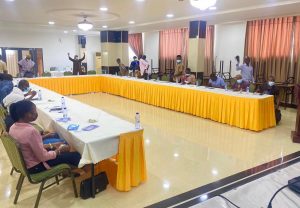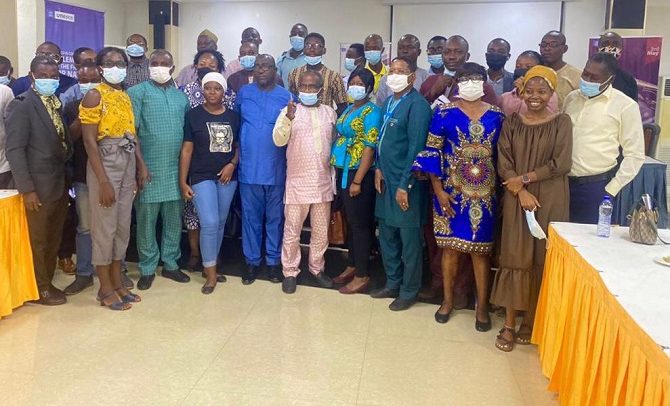Journalists at the consultative meeting in Tamale
The National Media Commission in collaboration with UNESCO has organized a consultative meeting with journalists in the Northern Region on the Coordinated Mechanism on the safety of journalists in Tamale in the Northern region.
The purpose of the meeting is to empower media practitioners to effectively performance their responsibilities professionally.
The Chairman of the National Media Commission, Mr. Yaw Boadu-Ayeboafoh, addressing journalists said the commission is building up a mechanism to ensure that should somebody attacks or threaten a journalist or makes it different for journalists to do what they are trained to do those individuals are punished to serve as deterrent to others.
“Sometimes people take the law into their own hands and nothing happens and this sometimes motivates other people to do similar things but we want to halt, media has been given a responsibilities and we can only do that when we are not threatened in anyway if we are allowed the freedom to operate.”
According to him, even if a journalist makes a mistake that should not warrant individuals to take the law into their own hands without recourse to the law.
“Anybody who does anything against the journalist or deliberately obstruct in the discharge of their responsibilities such people must be brought before the law and dealt with accordingly.”
Commenting on the culture of silence , Mr. Boadu-Ayeboafoh, said the issue of culture of silence affects the quality of public discussions adding that it goes a long way to produce more noise than factual discussions on media platforms.
He urged journalists to ensure that they are credible and reliable in the line of their duties and by so doing the general public will have some trust and believe in any information they send out.

“ When we result in hear say and speculations it undermines ourselves in terms of our credibility so if you establish credibility as a journalists and you build upon it whenever you speak people will listen to you but if anything that you hear without investigations and you put it in the public domain and it’s established that what you are saying has no basis tomorrow when you u come up with something nobody will believe you even though it might be factual beaus you have already discredited yourself .”
The UNESCO Head of Office, Abdouramane Diallo, who was the Special Guest, disclosed that over the past decade, a journalist has been killed on average every four days.
He noted that the year 2019 shows the lowest death toll recorded by UNESCO in the last decade with 57 deaths.
“Impunity for crimes against journalists continues to prevail. 2020 saw, however, a slight decrease in the rate of impunity, with a percentage of 13% of cases worldwide reported as resolved in comparison to 12% in 2019, and 11% in 2018.”
According to him, every year, the UNESCO Director General makes formal follow-up on journalists who have been killed. This is in line with the Resolution 29,on the Condemnation of violence against Journalists adopted by UNESCO’s General Conference at its 29th session in 1997.
“It is also in conformity with the Decision on the safety of journalists and the issue
of impunity, adopted by the Intergovernmental Council of UNESCO’s
International Programme for the Development of Communication (IPDC) at its 26th session in 2008, and renewed at subsequent sessions in 2010, 2012, 2014, and 2016.”
Mr. Diallo appealed to the Ghanaian authorities to do more to create a safe environment for journalists and media institutions as well as artists, to ensure better flow of information without risks for journalists and artists and stop impunity by strongly sanctioning perpetrators of attacks.
He said UNESCO facilitated the participation of two Supreme Court Justices to attend a special training for members of the judiciary on Freedom of Expression and again UNESCO is facilitating the participation of two Supreme Court judges on Freedom of Expression soon.
“We are also facilitating the partnership of UN agencies to support the implementation of the monitoring mechanism on safe and responsible journalism here in Ghana and I congratulate the Ministry of Information and the National media Commission for working behind the scenes with stakeholders on the realization of a national mechanism for the safety of journalists.”
The Acting Chairman of the Ghana Journalist Association in the Northern Region, Mr. Abdul Majeed thanked NMC and UNESCO for organizing the consultative meeting for journalists in the region.
“ This consultative meeting couldn’t have come at a better time than now as many journalists in recent times have come under attack in the region but its even sad sometimes as some institutions which are mandated to protect journalists are the same institutions that attacks journalists.”
He said the consultative meeting will empower journalists to know how to protect themselves when they are performing their duties and assured journalists in the region that GJA will do everything within their power to protect them in the region.
Representative of the Ghana Independent Broadcasters Association in the Northern Region. Mr. Kessie Ibrahim encouraged journalists in the region to ensure that they perform their duties in a professional manner and urged journalists to make good use of the knowledge and skills they will acquire during the consultative meeting to enhance their work.
FROM Eric Kombat, Tamale


